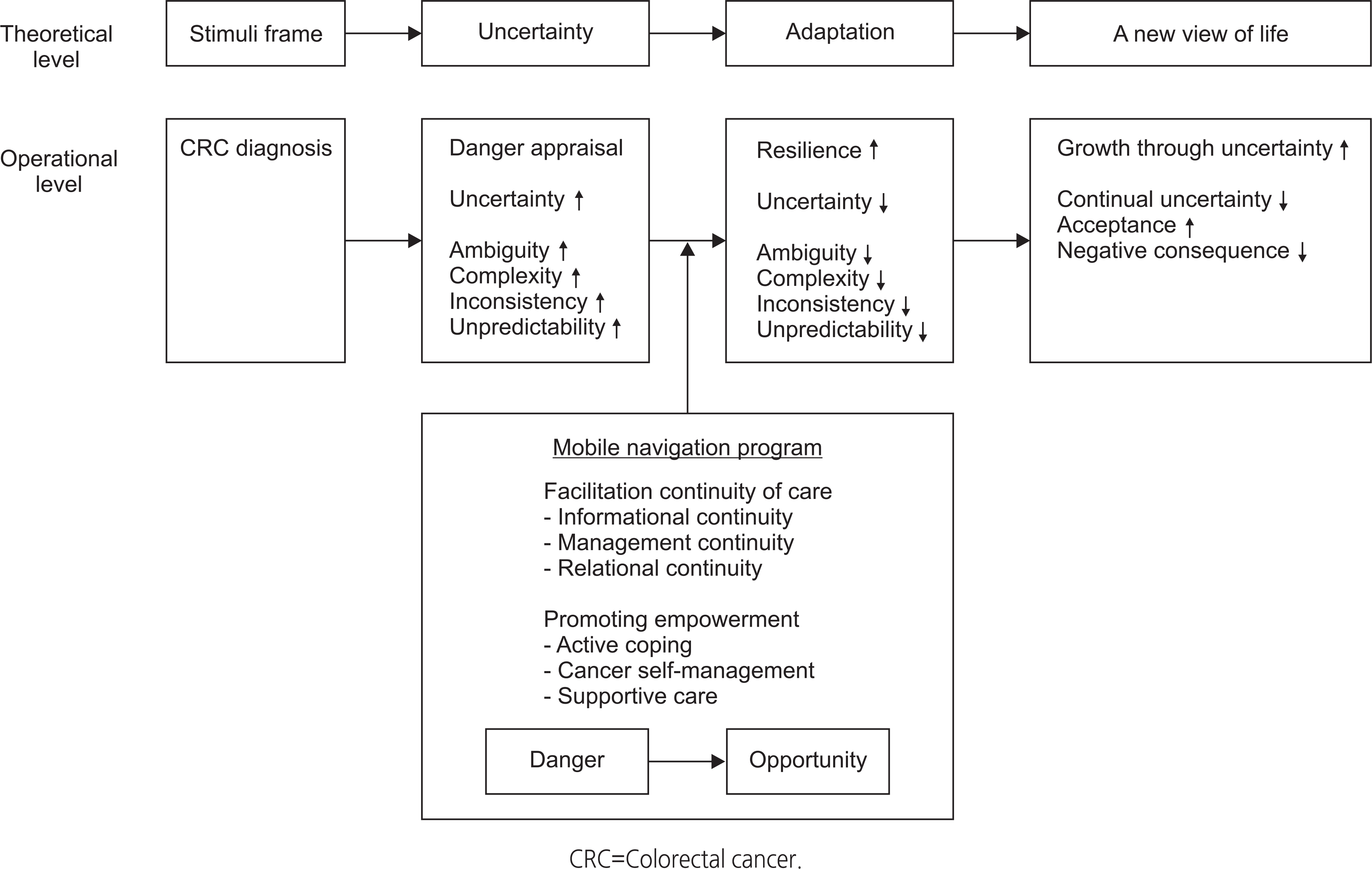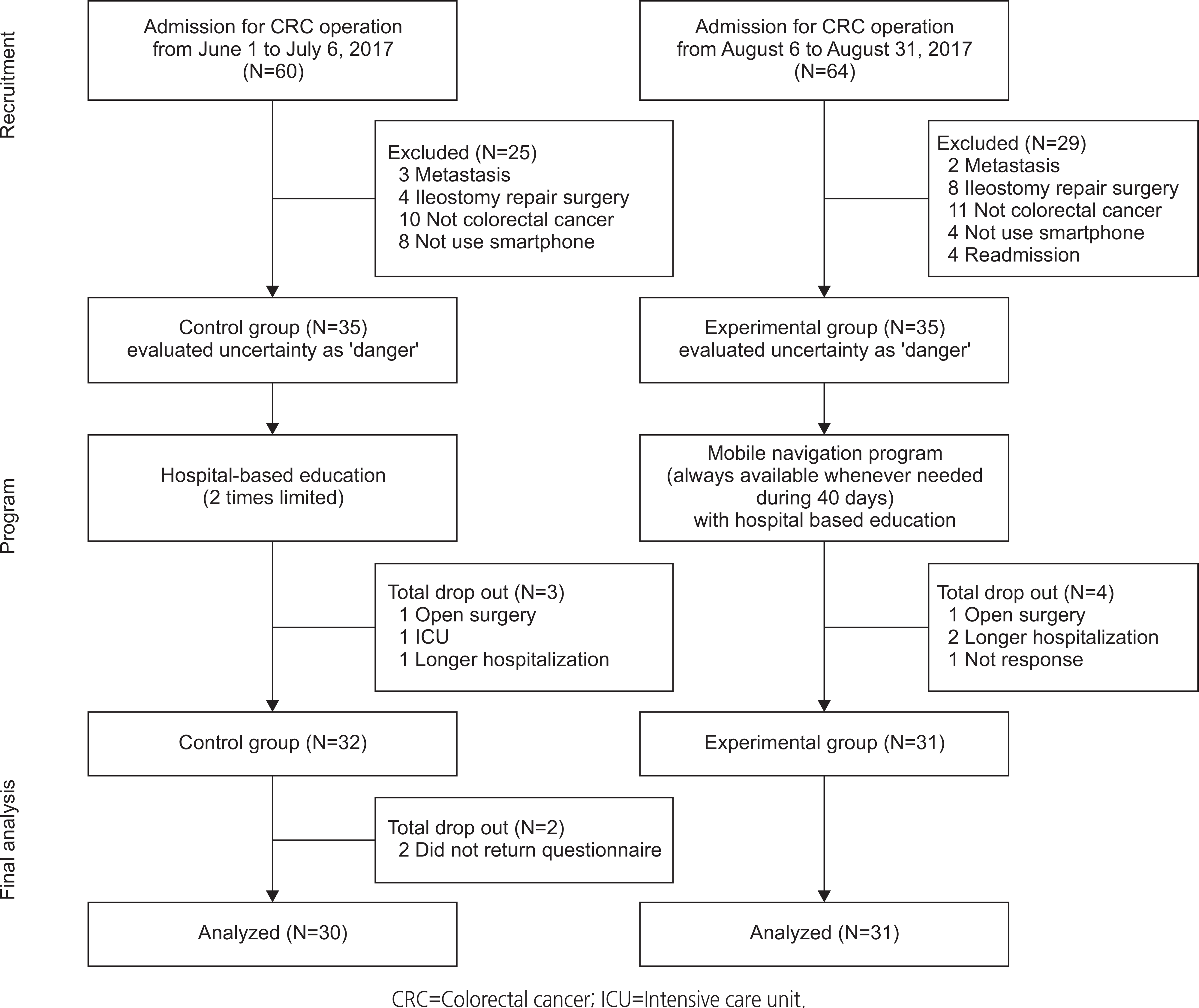Abstract
Purpose
This study aimed to examine the effects of a mobile navigation program on uncertainty, resilience, and growth through uncertainty in colorectal cancer patients.
Methods
To verify the effectiveness of the mobile navigation program, 61 participants diagnosed with colorectal cancer undergoing surgery were selected. A nonequivalent control group nonsynchronized design was used to evaluate the program. Uncertainty was measured using the Korean version of the Uncertainty in Illness Scale, resilience was measured using the Korean version of the Connor-Davidson Resilience Scale, and growth through uncertainty was measured using the Growth through Uncertainty Scale.
Results
Compared with the control group, patients in the mobile navigation program group showed significant differences in scores for uncertainty (F=7.22, p=.009) and resilience (F=4.31, p=.042), but not for growth through uncertainty (F=2.76, p=.102).
Conclusion
These results suggest that the mobile navigation program has positive effects on decreasing uncertainty and increasing resilience among colorectal cancer patients. The mobile navigation program could play a significant role in assisting colorectal cancer patients in regard to the continuity and usability of the program.
Go to : 
References
1. National Cancer Information Center. Cancer incidence [Internet]. Goyang: National Cancer Information Center;c2016. [cited 2015 Dec 23; Updated 2019 Jan 04]. Available from:. https://www.cancer.go.kr/lay1/S1T639C640/contents.do.
2. Min JH, Ahn KY, Park H, Cho W, Jung HJ, Kim NK, et al. The effect of post-operative exercise in colorectal cancer patients: A pilot randomized controlled trial (RCT) study. Asian Oncology Nursing. 2017; 17(1):29–36. https://doi.org/10.5388/aon.2017.17.1.29.

3. Kim KJ, Na YK, Hong HS. Effects of progressive muscle relaxation therapy in colorectal cancer patients. Western Journal of Nursing Research. 2016; 38(8):959–973. https://doi.org/10.1177/0193945916635573.

4. Choi KS, Park JA, Lee JH. The effect of symptom experience and resilience on quality of life in patients with colorectal cancers. Asian Oncology Nursing. 2012; 12(1):61–68. https://doi.org/10.5388/aon.2012.12.1.61.

5. Bang GR. A study on the relationship among uncertainty, spiritual needs on accroding to phases of illness in colorectal cancer patients [master’s thesis]. Seoul: Kyung Hee University;2014. p. 1–56.
6. Shaha M, Cox CL, Talman K, Kelly D. Uncertainty in breast, prostate, and colorectal cancer: Implications for supportive care. Journal of Nursing Scholarship. 2008; 40(1):60–67. https://doi.org/10.1111/j.1547-5069.2007.00207.x.

7. Cha K, Kim K. Impact of uncertainty on resilience in can- cer patients. Asian Oncology Nursing. 2012; 12(2):139–146. https://doi.org/10.5388/aon.2012.12.2.139.
8. Mishel MH, Sorenson DS. Uncertainty in gynecological cancer: A test of the mediating functions of mastery and coping. Nursing Research. 1991; 40(3):167–171. https://doi.org/10.1097/00006199-199105000-00010.
9. Hong YS, Park JY, Kim SH, Kim SA, Kim YH. Effects of a navigation program for patients with newly diagnosed gastric cancer: A randomized controlled trial. Asian Oncology Nursing. 2016; 16(3):132–138. https://doi.org/10.5388/aon.2016.16.3.132.

10. Ju AR, Yeoum SG, Park KS. The nursing needs of post-surgical colon cancer patients at discharge. Journal of Korean Academy of Fundamentals of Nursing. 2009; 16(4):392–401.
11. Choi JY, Kim SK, An JY, Kim GS. Development and evaluation of standardized telephone counseling guidelines on symptom management for patients discharged after colorectal cancer surgery. Asian Oncology Nursing. 2014; 14(3):191–201. https://doi.org/10.5388/aon.2014.14.3.191.

12. Gilbert JE, Green E, Lankshear S, Hughes E, Burkoski V, Sawka C. Nurses as patient navigators in cancer diagnosis: Review, consultation and model design. European Journal of Cancer Care. 2011; 20(2):228–236. https://doi.org/10.1111/j.1365-2354.2010.01231.x.

13. Kwon GA, Jeong GJ, Park JM, Jung MK, Seo HJ, Kim JY, et al. Development of navigation program for cancer patients using mobile application. Quality Improvement in Health Care. 2015; 21(2):28–38. https://doi.org/10.14371/QIH.2015.21.2.28.

14. Mishel MH. Uncertainty in illness. Journal of Nursing Scholarship. 1988; 20(4):225–232. https://doi.org/10.1111/j.1547-5069.1988.tb00082.x.

15. Mishel MH. Reconceptualization of the uncertainty in illness theory. Journal of Nursing Scholarship. 1990; 22(4):256–262. https://doi.org/10.1111/j.1547-5069.1990.tb00225.x.

16. Fillion L, Cook S, Veillette AM, Aubin M, de Serres M, Ra-inville F, et al. Professional navigation framework: Elaboration and validation in a Canadian context. Oncology Nursing Forum. 2012; 39(1):E58–E69. https://doi.org/10.1188/12.ONF.E58-E69.

17. Kang YH. Review on mid-range nursing theory: Uncertainty in illness theory. Korean Journal of Nursing Query. 2006; 15(1):120–133.
18. Polit DF, Beck CT, Owen SV. Is the CVI an acceptable indicator of content validity? Appraisal and recommendations. Research in Nursing & Health. 2007; 30(4):459–467. https://doi.org/10.1002/nur.20199.

19. Bertini E, Gabrielli S, Kimani S, Catarci T, Santucci G. Appropriating and assessing heuristics for mobile computing. Celentano A, editor. Proceedings of the Working Conference on Advanced Visual Interfaces; 2006 May 23–26; Venezia, Italy. New York (NY): ACM Press;c2006. p. 119–126.

20. Coe R. It’s the effect size, stupid: What effect size is and why it is important. Paper presented at: the Annual Conference of the British Educational Research Association. 2002. Sep 12-14; Exeter, England.
21. Chung CW, Kim MJ, Rhee MH, Do HG. Functional status and psychosocial adjustment in gynecologic cancer patients receiving chemotherapy. Korean Journal of Women Health Nursing. 2005; 11(1):58–66.

22. Connor KM, Davidson JR. Development of a new resilience scale: The Connor-Davidson Resilience Scale (CD-RISC). Depression and Anxiety. 2003; 18(2):76–82.

23. Mishel MH, Fleury J. The growth through uncertainty scale. Chapel Hill (NC): The university of North Carolina at Chapel Hill;1997.
24. Kim DR. Development and evaluation of uncertainty management program for mild cognitive impairment in elderly people [dissertation]. Seoul: Yonsei University;2016. p. 1–136.
25. Kim JI, Byeon YS. A study on the factors affecting resilience in patients with colon cancer. Asian Oncology Nursing. 2013; 13(4):256–264. https://doi.org/10.5388/aon.2013.13.4.256.

26. Kwak SY, Byeon YS. Factors influencing resilience of patients with hematologic malignancy. Korean Journal of Adult Nursing. 2013; 25(1):95–104. https://doi.org/10.7475/kjan.2013.25.1.95.

27. Kim JY. Uncertainty, social support, posttraumatic stress symptoms and psychological growth in patients with hematologic cancers [master’s thesis]. Seoul: Seoul National University;2015. p. 1–90.
28. Lin L, Yeh CH, Mishel MH. Evaluation of a conceptual model based on Mishel’s theories of uncertainty in illness in a sample of Taiwanese parents of children with cancer: A cross-sectional questionnaire survey. International Journal of Nursing Studies. 2010; 47(12):1510–1524. https://doi.org/10.1016/j.ijnurstu.2010.05.009.

29. Gil KM, Mishel MH, Belyea M, Germino B, Porter LS, Clayton M. Benefits of the uncertainty management intervention for African American and White older breast cancer survivors: 20-Month outcomes. International Journal of Behavioral Medicine. 2006; 13(4):286–294. https://doi.org/10.1207/s15327558ijbm1304_3.

Go to : 
Table 1.
Development of Contents for Menu App
Table 2.
Homogeneity General Characteristics and Study Variables in Pre-test between Experimental and Control Groups (N=61)
Table 3.
Comparison of Uncertainty, Resilience, Growth through Uncertainty between Experimental and Control Groups (N=61)




 PDF
PDF ePub
ePub Citation
Citation Print
Print




 XML Download
XML Download